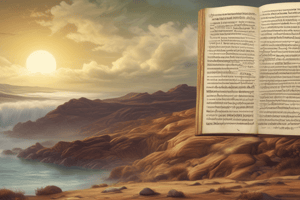Podcast
Questions and Answers
Who had to make the journey to raise the boy?
Who had to make the journey to raise the boy?
- Elijah
- Elisha (correct)
- Samuel
- The boy's father
What was the purpose of the school of the prophets?
What was the purpose of the school of the prophets?
- To teach the young men how to cook
- To train prophets and young men of faith (correct)
- To provide a place for the young men to socialize
- To offer an alternative to the apostate schools
What was the problem with the stew the young men were making?
What was the problem with the stew the young men were making?
- It was not nutritious enough
- It had poisonous gourds in it (correct)
- It was too spicy
- It was too salty
How did Elijah solve the problem with the stew?
How did Elijah solve the problem with the stew?
What is the cure for the 'death in the pot'?
What is the cure for the 'death in the pot'?
What was the problem in verses 42-44?
What was the problem in verses 42-44?
What did Elisha do to solve the problem of not enough food?
What did Elisha do to solve the problem of not enough food?
What is indicated by Hebrews 13:8?
What is indicated by Hebrews 13:8?
What is the significance of Elisha's miracles?
What is the significance of Elisha's miracles?
What is the author's final message?
What is the author's final message?
In whose place did the school of the prophets continue?
In whose place did the school of the prophets continue?
What was the young man trying to do when he added gourds to the stew?
What was the young man trying to do when he added gourds to the stew?
Why did Elijah add the meal to the stew?
Why did Elijah add the meal to the stew?
What is the significance of 1 Kings 17:21ff?
What is the significance of 1 Kings 17:21ff?
What does the 'death in the pot' symbolize?
What does the 'death in the pot' symbolize?
What was multiplied by Elisha in verses 42-44?
What was multiplied by Elisha in verses 42-44?
What is the relevance of John 6 in this context?
What is the relevance of John 6 in this context?
What does the author want the reader to do?
What does the author want the reader to do?
What is the nature of God according to Hebrews 13:8?
What is the nature of God according to Hebrews 13:8?
What is the characteristic of Elisha's miracles?
What is the characteristic of Elisha's miracles?
Flashcards are hidden until you start studying
Study Notes
David Sorrows over Saul's Death (2 Samuel 1)
- David mourns the death of Saul and Jonathan, despite Saul's pursuit of David's life
- David's lamentation connects with Jonathan's use of the bow (1 Samuel 20:20ff)
- David's chief concern is the death of the Lord's anointed, and the glory of the Lord being dimmed
David Struggles against Saul's Family (2 Samuel 2-4)
- David's march to the throne was marked by struggles and plots against him
- Abner, commander of Saul's army, made Ishbosheth king over the other tribes
- Joab, Abishai, and Asahel were David's nephews and valued men in his army
- The murder of Asahel (2 Samuel 2) led to the "long war" between the two kings
- Abner's murder (2 Samuel 3) was avenged by Joab, who killed him in revenge for his brother Asahel's death
- Ishbosheth's death (2 Samuel 4) paved the way for David to become king over the entire nation
David Succeeds to Saul's Throne (2 Samuel 5)
- David reigned over Judah for seven years, then over the entire nation for thirty-three years
- He chose Jerusalem as his capital, capturing it from the Jebusites
- The Philistines attacked, but David sought God's guidance and defeated them
Solomon Fulfills God's Word (1 Kings 1)
- Adonijah, David's son, attempted to crown himself king, but Solomon was appointed by God
- Three loyal servants (Zadok, Nathan, and Bathsheba) helped to crown Solomon as king
- Solomon promised not to kill Adonijah, who had rebelled against God's will
Solomon Executes God's Wrath (1 Kings 2)
- David's last counsels to Solomon emphasized walking in the ways of the Lord
- Adonijah's rebellion led to his execution, along with Abiathar and Joab
- Solomon's judgment on his enemies established his rule and authority
Solomon Receives God's Wisdom (1 Kings 3)
- Solomon asked God for wisdom and an understanding heart, and God granted his request
- God also gave Solomon wealth and honor, and Solomon's wisdom was demonstrated in the case of the two mothers
Solomon Enjoys God's Wealth (1 Kings 4)
- Solomon's reign was marked by material prosperity, but spiritual prosperity was lacking
- Solomon took foreign wives and horses from Egypt, disobeying God's laws
- Solomon's wisdom was demonstrated in nature studies, but Jesus Christ is greater than Solomon### Miracles Performed to Assist the Needy
- God takes what we have and uses it to meet the need, if we trust Him (Ex. 4:2)
- The prophet's widow (2 Kings 4:1-7) received God's provision, and those who loaned her vessels benefited too
- Elisha often "shut the door" when asking for God's help (2 Kings 4:21, 33)
The Shunammite Woman
- God gave the woman a son when her husband was old (2 Kings 4:8-37)
- God raised the boy back to life when he was stricken (2 Kings 4:8-37)
- The woman had true spiritual values, making a special room on the roof for the visiting prophet (2 Kings 4:8-37)
- Elisha was socially inclined, unlike Elijah (2 Kings 4:8-37)
- The woman's faith was rewarded with a son, but the son was stricken in the field and taken home dead
- The mother did not despair, and Elisha himself had to make the journey to raise the boy (2 Kings 4:8-37)
The School of the Prophets
- The school of the prophets may have been started by Samuel (1 Sam. 10:10) and continued by Elijah (1 Kings 20:35)
- Not all of the young men were men of faith, and there may have been rival "apostate schools" in the land (2 Kings 2:23-25)
- Elisha added meal to the pottage to heal it, illustrating the importance of the pure meal of the Word of God (2 Kings 4:38-44)
- Elisha multiplied the food to meet the needs of all the men, similar to Jesus' miracle in John 6
David Sorrows over Saul's Death (2 Samuel 1)
- David mourns the death of Saul and Jonathan, despite Saul's pursuit of David's life
- David's lamentation connects with Jonathan's use of the bow (1 Samuel 20:20ff)
- David's chief concern is the death of the Lord's anointed, and the glory of the Lord being dimmed
David Struggles against Saul's Family (2 Samuel 2-4)
- David's march to the throne was marked by struggles and plots against him
- Abner, commander of Saul's army, made Ishbosheth king over the other tribes
- Joab, Abishai, and Asahel were David's nephews and valued men in his army
- The murder of Asahel (2 Samuel 2) led to the "long war" between the two kings
- Abner's murder (2 Samuel 3) was avenged by Joab, who killed him in revenge for his brother Asahel's death
- Ishbosheth's death (2 Samuel 4) paved the way for David to become king over the entire nation
David Succeeds to Saul's Throne (2 Samuel 5)
- David reigned over Judah for seven years, then over the entire nation for thirty-three years
- He chose Jerusalem as his capital, capturing it from the Jebusites
- The Philistines attacked, but David sought God's guidance and defeated them
Solomon Fulfills God's Word (1 Kings 1)
- Adonijah, David's son, attempted to crown himself king, but Solomon was appointed by God
- Three loyal servants (Zadok, Nathan, and Bathsheba) helped to crown Solomon as king
- Solomon promised not to kill Adonijah, who had rebelled against God's will
Solomon Executes God's Wrath (1 Kings 2)
- David's last counsels to Solomon emphasized walking in the ways of the Lord
- Adonijah's rebellion led to his execution, along with Abiathar and Joab
- Solomon's judgment on his enemies established his rule and authority
Solomon Receives God's Wisdom (1 Kings 3)
- Solomon asked God for wisdom and an understanding heart, and God granted his request
- God also gave Solomon wealth and honor, and Solomon's wisdom was demonstrated in the case of the two mothers
Solomon Enjoys God's Wealth (1 Kings 4)
- Solomon's reign was marked by material prosperity, but spiritual prosperity was lacking
- Solomon took foreign wives and horses from Egypt, disobeying God's laws
- Solomon's wisdom was demonstrated in nature studies, but Jesus Christ is greater than Solomon### Miracles Performed to Assist the Needy
- God takes what we have and uses it to meet the need, if we trust Him (Ex. 4:2)
- The prophet's widow (2 Kings 4:1-7) received God's provision, and those who loaned her vessels benefited too
- Elisha often "shut the door" when asking for God's help (2 Kings 4:21, 33)
The Shunammite Woman
- God gave the woman a son when her husband was old (2 Kings 4:8-37)
- God raised the boy back to life when he was stricken (2 Kings 4:8-37)
- The woman had true spiritual values, making a special room on the roof for the visiting prophet (2 Kings 4:8-37)
- Elisha was socially inclined, unlike Elijah (2 Kings 4:8-37)
- The woman's faith was rewarded with a son, but the son was stricken in the field and taken home dead
- The mother did not despair, and Elisha himself had to make the journey to raise the boy (2 Kings 4:8-37)
The School of the Prophets
- The school of the prophets may have been started by Samuel (1 Sam. 10:10) and continued by Elijah (1 Kings 20:35)
- Not all of the young men were men of faith, and there may have been rival "apostate schools" in the land (2 Kings 2:23-25)
- Elisha added meal to the pottage to heal it, illustrating the importance of the pure meal of the Word of God (2 Kings 4:38-44)
- Elisha multiplied the food to meet the needs of all the men, similar to Jesus' miracle in John 6
Studying That Suits You
Use AI to generate personalized quizzes and flashcards to suit your learning preferences.




